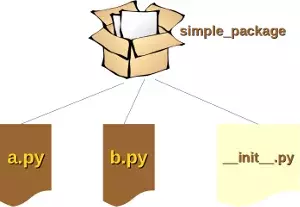31. Packages
By Bernd Klein. Last modified: 08 Nov 2023.
Introduction
We learned that modules are files containing Python statements and definitions, like function and class definitions. We will learn in this chapter how to bundle multiple modules together to form a package.
A package is basically a directory with Python files and a file with the name __init__.py. This means that every directory inside of the Python path, which contains a file named __init__.py, will be treated as a package by Python. It's possible to put several modules into a Package.
Packages are a way of structuring Python’s module namespace by using "dotted module names". A.B stands for a submodule named B in a package named A. Two different packages like P1 and P2 can both have modules with the same name, let's say A, for example. The submodule A of the package P1 and the submodule A of the package P2 can be totally different. A package is imported like a "normal" module. We will start this chapter with a simple example.
Live Python training
See our Python training courses
A Simple Example

We will demonstrate with a very simple example how to create a package with some Python modules. First of all, we need a directory. The name of this directory will be the name of the package, which we want to create. We will call our package "simple_package". This directory needs to contain a file with the name __init__.py. This file can be empty, or it can contain valid Python code. This code will be executed when a package is imported, so it can be used to initialize a package, e.g. to make sure that some other modules are imported or some values set. Now we can put all of the Python files which will be the submodules of our module into this directory. We create two simple files a.py and b.py just for the sake of filling the package with modules.
The content of a.py:
def bar():
print("Hello, function 'bar' from module 'a' calling")
The content of b.py:
def foo():
print("Hello, function 'foo' from module 'b' calling")
We will also add an empty file with the name __init__.py inside of simple_package directory.
Let's see what happens, when we import simple_package from the interactive Python shell, assuming that the directory simple_package is either in the directory from which you call the shell or that it is contained in the search path or environment variable "PYTHONPATH" (from your operating system):
import simple_package
simple_package/a
OUTPUT:
--------------------------------------------------------------------------- NameError Traceback (most recent call last) <ipython-input-3-347df8a711cc> in <module> ----> 1 simple_package/a NameError: name 'a' is not defined
simple_package/b
OUTPUT:
--------------------------------------------------------------------------- NameError Traceback (most recent call last) <ipython-input-4-e71d2904d2bd> in <module> ----> 1 simple_package/b NameError: name 'b' is not defined
We can see that the package simple_package has been loaded but neither the module "a" nor the module "b"! We can import the modules a and b in the following way:
from simple_package import a, b
a.bar()
b.foo()
OUTPUT:
Hello, function 'bar' from module 'a' calling Hello, function 'foo' from module 'b' calling
As we have seen at the beginning of the chapter, we can't access neither "a" nor "b" by solely importing simple_package.
Yet, there is a way to automatically load these modules. We can use the file __init__.py for this purpose. All we have to do is add the following lines to the so far empty file __init__.py:
import simple_package.a import simple_package.b
It will work now:
import simple_package
simple_package.a.bar()
simple_package.b.foo()
OUTPUT:
Hello, function 'bar' from module 'a' calling Hello, function 'foo' from module 'b' calling
A More Complex Package
We will demonstrate in the following example how we can create a more complex package. We will use the hypothetical sound-Modul which is used in the official tutorial. (see https://docs.python.org/3/tutorial/modules.html)
sound |-- effects | |-- echo.py | |-- __init__.py | |-- reverse.py | `-- surround.py |-- filters | |-- equalizer.py | |-- __init__.py | |-- karaoke.py | `-- vocoder.py |-- formats | |-- aiffread.py | |-- aiffwrite.py | |-- auread.py | |-- auwrite.py | |-- __init__.py | |-- wavread.py | `-- wavwrite.py `-- __init__.py
We will implement a dummy - just empty files with the right names - implementation of this structure. We will provide various variations of the implementations. To differentiate between the implementations we will call the modules soound1, sound2, sound3, and sound4. Basically, they should all be called sound. You can download the examples as bzip-files:
- /sounds/sounds1.tar.bz2
- /sounds/sounds2.tar.bz2
- /sounds/sounds3.tar.bz2
- /sounds/sounds4.tar.bz2
- /sounds/sounds5.tar.bz2
- /sounds/sounds6.tar.bz2
- /sounds/sounds7.tar.bz2
We will start with the package sound1. (You can unpack it with tar xvjf sound1.tar.bz2)
If we import the package sound1 by using the statement import sound1, the package sound1 but not the subpackages effects, filters and formats will be imported, as we will see in the following example. The reason for this consists in the fact that the file __init__.py doesn't contain any code for importing subpackages:
import sound1
print(sound1)
print(sound1.effects)
OUTPUT:
<module 'sound1' from '/data/Dropbox (Bodenseo)/Bodenseo Team Folder/melisa/notebooks_en/sound1/__init__.py'> --------------------------------------------------------------------------- AttributeError Traceback (most recent call last) <ipython-input-2-0b6d7fed3b24> in <module> 3 print(sound1) 4 ----> 5 print(sound1.effects) AttributeError: module 'sound1' has no attribute 'effects'
If you also want to use the package effects, you have to import it explicitly with import sound.effects:
import sound1.effects
print(sound1.effects)
OUTPUT:
<module 'sound1.effects' from '/data/Dropbox (Bodenseo)/Bodenseo Team Folder/melisa/notebooks_en/sound1/effects/__init__.py'>
It is possible to have the submodule importing done automatically when importing the sound1 module. We will change now to sound2 to demonstrate how to do this. We use the same files as in sound1, but we will add the code line import sound2.effects into the file __init__.py of the directory sound2. The file should look like this now:
"""An empty sound package
This is the sound package, providing hardly anything!"""
import sound2.effects
print("sound2.effects package is getting imported!")
)
If we import the package sound2 from the interactive Python shell, we will see that the subpackage effects will also be automatically loaded:
import sound2
OUTPUT:
sound2 package is getting imported!
Instead of using an absolute path we could have imported the effects-package relative to the sound package.
"""An empty sound package
This is the sound package, providing hardly anything!"""
from . import effects
print("sound package is getting imported!")
We will demonstrate this in the module sound3:
import sound3
OUTPUT:
effects package is getting imported!
It is also possible to automatically import the package formats, when we are importing the effects package. We can also do this with a relative path, which we will include into the __init__.py file of the directory effects:
from .. import formats
Importing sound4 will also automatically import the modules formats and effects:
import sound4
To end this subchapter we want to show how to import the module karaoke from the package filters when we import the effects package. For this purpose we add the line from ..filters import karaoke into the __init__.py file of the directory effects. The complete file looks now like this:
"""An empty effects package
This is the effects package, providing hardly anything!"""
from .. import formats
from ..filters import karaoke
print("effects package is getting imported!")
Importing sound results in the following output:
import sound5
OUTPUT:
formats package is getting imported! importing from the effects package: formats module is getting imported! filters package is getting imported! Module karaoke.py has been loaded! karaoke module is getting imported! effects package is getting imported!
We can access and use the functions of karaoke now:
sound5.filters.karaoke.func1()
OUTPUT:
Funktion func1 has been called!
Importing a Complete Package
For the next subchapter we will use again the initial example from the previous subchapter of our tutorial. We will add a module (file) foobar (filename: foobar.py) to the sound directory. The complete package can again be downloaded as a bzip-file. We want to demonstrate now, what happens, if we import the sound package with the star, i.e. from sound import *. Somebody might expect to import this way all the submodules and subpackages of the package. Let's see what happens:
from sound6 import *
OUTPUT:
sound package is getting imported!
So we get the comforting message that the sound package has been imported. Yet, if we check with the dir function, we see that neither the module foobar nor the subpackages effects, filters and formats have been imported:
for mod in ['foobar', 'effects', 'filters', 'formats']:
print(mod, mod in dir())
OUTPUT:
foobar False effects False filters False formats False
Python provides a mechanism to give an explicit index of the subpackages and modules of a packages, which should be imported. For this purpose, we can define a list named __all__. This list will be taken as the list of module and package names to be imported when from package import * is encountered.
We will add now the line
__all__ = ["formats", "filters", "effects", "foobar"]
to the __init__.py file of the sound directory. We get a completely different result now:
from sound7 import *
OUTPUT:
sound package is getting imported! formats package is getting imported! filters package is getting imported! effects package is getting imported! foobar module is getting imported
Even though it is already apparent that all the modules have been imported, we can check with dir again:
for mod in ['foobar', 'effects', 'filters', 'formats']:
print(mod, mod in dir())
OUTPUT:
foobar True effects True filters True formats True
The next question is what will be imported, if we use * in a subpackage:
from sound.effects import * sound package is getting imported! effects package is getting imported! dir() ['__builtins__', '__doc__', '__loader__', '__name__', '__package__', '__spec__']
Like expected the modules inside of effects have not been imported automatically. So we can add the following __all__ list into the __init__ file of the package effects:
We have to add to the __init__.py files of the directories filters, formats and effects corrrespondingly the following lines of code:
__all__ = ["equalizer", "__init__", "karaoke", "vocoder"]
__all__ = ["aiffread", "aiffwrite", "auread", "auwrite", "wavread", "wavwrite"]
__all__ = ["echo", "surround", "reverse"]
Now we get the intended result:
from sound8 import *
OUTPUT:
sound package is getting imported! formats package is getting imported! filters package is getting imported! effects package is getting imported! foobar module is getting imported
from sound8.effects import *
OUTPUT:
Module echo.py has been loaded! Module surround.py has been loaded! Module reverse.py has been loaded!
from sound8.filters import *
OUTPUT:
Module equalizer.py has been loaded! Module karaoke.py has been loaded! Module vocoder.py has been loaded!
from sound8.formats import *
OUTPUT:
Module aiffread.py has been loaded! Module aiffwrite.py has been loaded! Module auread.py has been loaded! Module auwrite.py has been loaded! Module wavread.py has been loaded! Module wavwrite.py has been loaded!
Although certain modules are designed to export only names that follow certain patterns when you use import , it is still considered bad practice. The recommended way is to import specific modules from a package instead of using .
